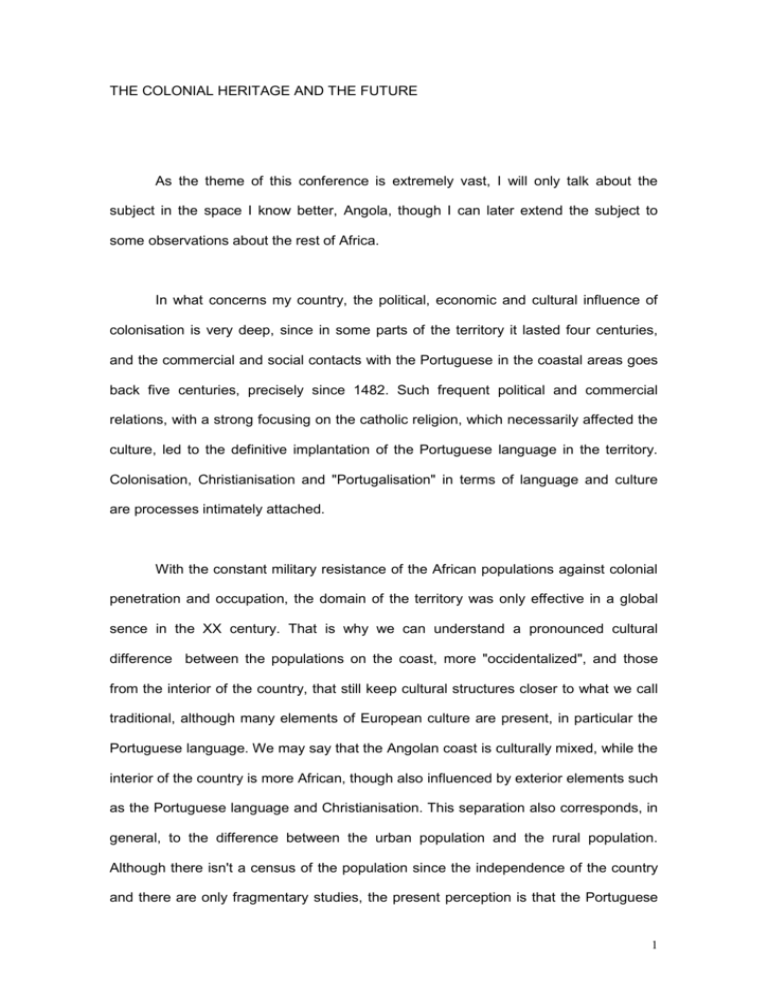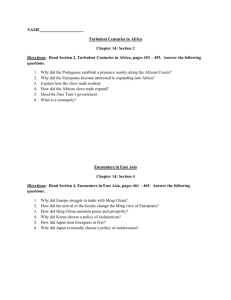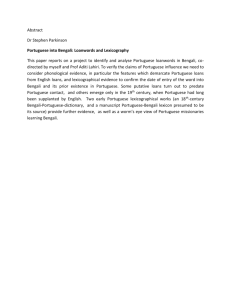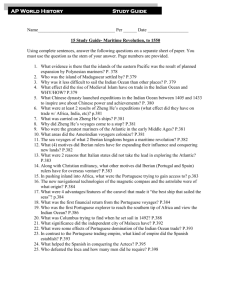the colonial heritage and the future
advertisement

THE COLONIAL HERITAGE AND THE FUTURE As the theme of this conference is extremely vast, I will only talk about the subject in the space I know better, Angola, though I can later extend the subject to some observations about the rest of Africa. In what concerns my country, the political, economic and cultural influence of colonisation is very deep, since in some parts of the territory it lasted four centuries, and the commercial and social contacts with the Portuguese in the coastal areas goes back five centuries, precisely since 1482. Such frequent political and commercial relations, with a strong focusing on the catholic religion, which necessarily affected the culture, led to the definitive implantation of the Portuguese language in the territory. Colonisation, Christianisation and "Portugalisation" in terms of language and culture are processes intimately attached. With the constant military resistance of the African populations against colonial penetration and occupation, the domain of the territory was only effective in a global sence in the XX century. That is why we can understand a pronounced cultural difference between the populations on the coast, more "occidentalized", and those from the interior of the country, that still keep cultural structures closer to what we call traditional, although many elements of European culture are present, in particular the Portuguese language. We may say that the Angolan coast is culturally mixed, while the interior of the country is more African, though also influenced by exterior elements such as the Portuguese language and Christianisation. This separation also corresponds, in general, to the difference between the urban population and the rural population. Although there isn't a census of the population since the independence of the country and there are only fragmentary studies, the present perception is that the Portuguese 1 language is spoken by nearly 90% of the population, evidently with different competencies, and it is today, the most important mother tongue of the Angolan people, comprising about 50% of the population. Curiously, this expansion of the Portuguese language was much more intense after the Independence than during the colonial period. On the other side, recent studies indicate that half of the population declares itself catholic and nearly 20% declares itself non catholic Christian, where the protestant creeds and the messianic creeds with an African origin can be included, remaining over 30% to animist and atheist. These few elements show that there was a very strong influence of colonisation in the cultural component of the entire Angolan territory. But in the coastal cities the influence reached other levels, particularly customs, social structures and even tastes. As an example we can refer the existence since the middle of the XIX century of a major Portuguese press, some bilingual newspapers, Portuguese and an African language. In the case of the literary works, starting to be edited from the same period on, middle of the XIX century, they were only published in Portuguese and, probably, also written in that European language, a process that persists to present time. As Portugal was a limping, poor and scarsely populated empire, the colonisation of Angola until the XIX century was made mainly by convicts of common or religious law, deportees to whom was given the possibility to choose between rotting in the jails of Portugal or Brazil or risking the danger to perish in wars or defeated by malaria in Angola, being free after a year of survival, to dedicate themselves to the traffic of slaves, the only reason for the Portuguese domain on the territory. So, they were not the most competent agents to "spread Faith and Civilisation". Mostly men, they would eventually find a woman in the African communities with which they entered into contact, and as such, effectively starting a mixed group that became a sort of intermediary class, not only with important functions in commerce, but also in public 2 administration, in the army and in the church, which started to gain progressive social and cultural importance, a fact that marked decisively the coastal culture and its tendency to look preferably toward the Atlantic, be it Europe or America, particularly Brazil. To this type of culture, the African continent, or more precisely, its interior region, was only the place where slaves were caught, a sort of barbarian land. Still today, this cultural construction causes prejudices against the continent, which can be seen in the Angolan diplomacy, for instance. During the national liberation fight and after the Independence, the elite’s main preocupation was the creation of a single Nation emerging from the fight and afterwards, that the ensuing nation was based on the centralised State, because they feared fractures based on ethnic and cultural differences. The Portuguese language was one of the instruments used to acomplish this purpose. It was declared as the only official language, the language of education, press and work. With the exception of songs, several times using African languages, all cultural and social manifestations were made and still are made in Portuguese. So, it is no surprise that families, in particular urban families, prefer this language for their children, paying no attention to the African languages. Though the official speech had always defended the principle of the need to defend and promote the African languages, that wasn't the reality. For that reason sporadic attempts to teach the region’s languages to adults have never had a continuous following. Nowadays, because of the insistence resulting from a meeting of writers, that took place in August of last year, the government accepted the principle of introducing the teaching of the most important mother tongues in the school. We shall see if there is the political will to implement this decision. This is not an unimportant question. Studying the data of some divided census made in 1983, at that time I wrote a text where I called attention to the fact that, already then, more than two thirds of the 3 children in the main cities only spoke Portuguese. Posterior data shows that this tendency spread out and today in the territory where kimbundu, a banto language, was traditionally spoken, Portuguese is the only language found. Kimbundu, which used to be the second language in Angola, is in serious risk of disappearing or being completely adulterated by the influence of the Portuguese language. When a language vanishes, an important historical and cultural base of the individual’s dignity and his insertion in a certain identity also disapears. For this reason, I think this is a very important matter. The argument that a language spoken by all the population strengthens the feeling of belong to a whole is irrefutable, and absolutely understandable in a nation building process, though there might exist multilingual nations. The problem in Angola is that, as the competence to express oneself in Portuguese is not the same according to the regions or social groups, in particular the domain of the written language, this difference carries out an important social stratification, since the best educational, employment and even business opportunities are reserved for those who hold the best levels of language competency. During several generations, those who benefited from the situation were always recruited from the eternally privileged elite, and the peasants and their heirs were relegated to the heavier and less paid jobs, or destined to enlarge the number of evergrowing unemployed in cities throughtout the country. To end this language question, I would like to say that in my opinion it seems necessary, practicable and not terribly expensive to arrive at a situation of bilingualism, where each citizen speaks the national communication language, a door to the world, in this case the Portuguese language, and a language from his origin region. That would encourage a constant dialogue between the African and European languages, extremely stimulating to literature, a point very important to us, in particular. This is a 4 position that is gaining more and more support and I hope that the latest government's decisions lead in that direction. The question of language opens the door to the debate about the relation between culture and development, which leads me to generalise some observations that I have made, and for which I beg for your kindness, because they are dreams rather than Cartesian reasoning, lyric speculations rather than scientific conclusions. The problem exists and has been reported several times. Maybe the proposed solution is the work of an insane mind. That is why I apologise in advance. We all admit that till now, Africa has been an ungoverned and disorientated toy in the rough see of strange and rival interests. Its own political, economic and social organisation models have been imposed by the exterior. First the colonisation that, when "spreading Faith and Civilisation", declared to know what was best for the people under its domain, as if in fact it had questioned itself seriously in that regard. The model was imposed, and it was then necessary to accept and copy the European States or simply to copy the gestures, attitudes and movements of the white coloniser. With weak results, because, either the African people didn't know how to fully imitate what the white man did or thought, working with different registers, or they simply didn't want to fully accomplish it’s implemention, since it would drive them hopelessly away from their own identity. This attempt to create "white soul Negroes" only resulted on the surface and in episodic cases. And it soon disintegrated as soon as the conditions for rejection were minimally gathered. With differences according to the particular strain of colonialism, an elite withdrawn from the populations was created. This elite was depersonalised, living in the so called "colonised complex", as was so keenly analysed by Albert Memmi in the beginning of the 50s. But, contrary to appearances, that complex was not constructive, not even in the sense of leading the African people to develop similar mentalities, although submitted to the coloniser. In the cases where this 5 assimilation policy was developed, the colonised man feared the white man and admired his capacity to dominate unknown technologies, but at the same time secretly developed resentments, because he knew he could never be seen as an equal, and he was just an instrument domination of other aborigines that were far from the colonial power centres. After the independence movements, either because of the strength of the elite deformed by the complexes caused by colonisation, or because of the factors connected to the so called Cold War, the fact is that some countries tried to imitate the capitalist development models and other Eastern European models. But those models were pale copies destined to failure, because they were imposed by the exterior and applied without much reflection. Nowadays, with the victory of the capitalist and liberal model, we are witnessing the injection of huge doses of the miraculous elixir called the market economy, as the universal and sacred remedy to all diseases of African societies. Since a universal remedy cannot be applied alone, a second miraculous cure imposed itself, “the parliamentary democracy”. With the assistance of these two scientific discoveries supported by two competent and victorious assistants, the IMF and the World Bank, Africa will walk successfully towards the stars, after the turbulence of this transition period is over. At least, that is what the owners of the World promise us with a straight face... And some believe them. As for me, it is time to stop and start thinking. I have been proposing for a long time, since the moment I started to realise what the owners of the World expect from us, that Africa has to get together, as it is still done in some societies, under one or many big trees, with the kind spirits of the ancestors assisting and blessing amongst the leaves, and talk about the future. We have to relearn the virtue of a calm conversation, balancing the cases, unhurriedly, because time is our invention and we can mould it as we want. And discuss, discuss, till we reach an agreement. This was 6 how it was done in the ancient times, and now, this is the way we must ponder important questions. We shouldn't fear those who call us retrograde, lovers of the traditions that were surpassed by the frenzy of the machine, yearning for the uses that have been despised by scientific progress, or other sort of kindness, when they simply want to tell us that we are backward nations. If we are already late, maybe in an irrecoverable way, as far as economic and technologic progress, I just don't understand why we shouldn't admit that truly we are backward nations. And, we should learn from that delay. Africa has to reflect and talk. About what? The future, of course. We have to know in what sort of society we want to live. Could the satiated and unsafe societies of the North be our model? Do we want to live like that? Do we want to deny some of our values, that are being daily overwhelmed by the rules that our abulic leaders receive from the owners of the World, to adopt the rational principles of the social structure discovered in the Occident? Or would we like to invent societies closer to our cultural origins, according to social rules and values that have resisted by a miracle to the constant attempts of colonisation of the spirit? In the East of Angola, and because I was writing a book at that time, "As Aventuras de Ngunga", which was immediately translated into the Mbunda language, the main language of that region, I became aware of the inexistence of a word to translate the Portuguese word orphan. And then I understood why the mbunda language did not have the corresponding word for orphan. The reason was that in that region there were no orphans, sociologically speaking. A child that had lost the biological parents would immediately have other parents, people with the same age as the child's progenitors, which were also considered the child's parents. They adopted the child automatically. And I began to wonder that those values that prevented the children from staying alone or in charity institutions, probably had persisted along the 7 years because colonial penetration was very recent in those regions and not very profound. But these values wouldn't resist to new economic models, to which another person in the family is a heavy burden. I don't know what is happening today in those regions mangled by a long war, but I am almost certain that the actual vicissitudes were very efficient and part of the children living in the streets of Angola are also from the societies that I visited a long time ago. Wouldn't it be a tremendous lost? Isn't there a way to preserve this and other equivalent values that the so called “western Civilisation” is destroying? We should also question ourselves about the type of political and economic organisation that we consider more adjusted to our temperament. Could it be the celebrated parliamentary democracy, where the citizens vote each four years in some people that nobody knows and during that time those elected do whatever they want in the name of those who elected them? Could it be a method that means that some win and the others lose? Wouldn't it be interesting to conciliate the African principle of consensus with that process, in detriment to the principle of exclusion of a minority which is forcibly implicated by an election? These are complicated questions that cannot be easily answered. Likewise, maybe it would make sense to discuss the liberal economic model. Would it be advisable to give the single blind strength of the market the responsibility to establish the relative value of things? Is a tortoise really worth three kilos of maize? Can the ineffable international organisations really determine that and many other things from so far away? Furthermore, since presently the main economy of our countries is informal, at least this is the sector that gathers greatest number of people and that registers the more creative initiatives, why should we continue to throw it to the ghetto of illegality? or should we consider it as a viable structure to seize? At least in Luanda, the informal transports sector minimised in great part the circulation problems suffered by the discriminated populations of the shanty towns. 8 Will we have the courage, imagination, madness, call it what you want, to gather under the tree, and try to invent a new thing, our thing? This is my challenge and my hope. That the African people have the courage to say: stop, wait, now it is our time to decide. We accept your wonderful discoveries, we adopt them as ours, from the bicycle to the computer. We also want societies ruled by the intransigent defence of the people's rights to the unrestricted freedom of option, opinion and expression, with institutions that secure those liberties and stop firmly any way of oppression. But those should be our institutions, which we can understand and control, ruled by principles that we feel deep inside us, because they belong to our culture. We also want to build peaceful societies, with equal opportunities for all and not only for the fortunate elite. But with methods that we can successfully apply and without violating the millenary ethics upon which we were socialised. Destiny shall also be African if in fact we are able to impose our own decisions to blind and deaf western power centres, dazzled by their own power and efficiency. If we have the courage to do it, we will be helping the rest of the World searching for more humanitarian forms of development. We will be helping self comprehension even from those parts of Humanity that are convinced of the irreversibility of their own progress and of the eternity of their economic, cultural and military power. Intrinsically, Africa will be again spreading civilisation, as it did in the primordial times, when men left the African continent to populate the rest of the Earth. Dream, utopia, madness? Maybe. I agree that the majority of the people are not ready to hear such heresies. But life is very dull without a little madness... And without some heresy, no Faith will survive. Pepetela 9









